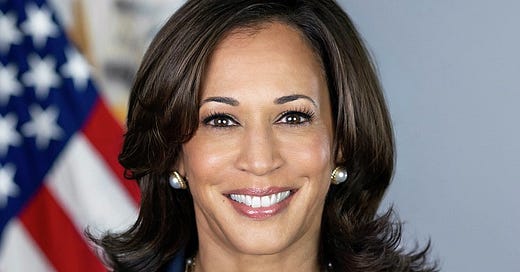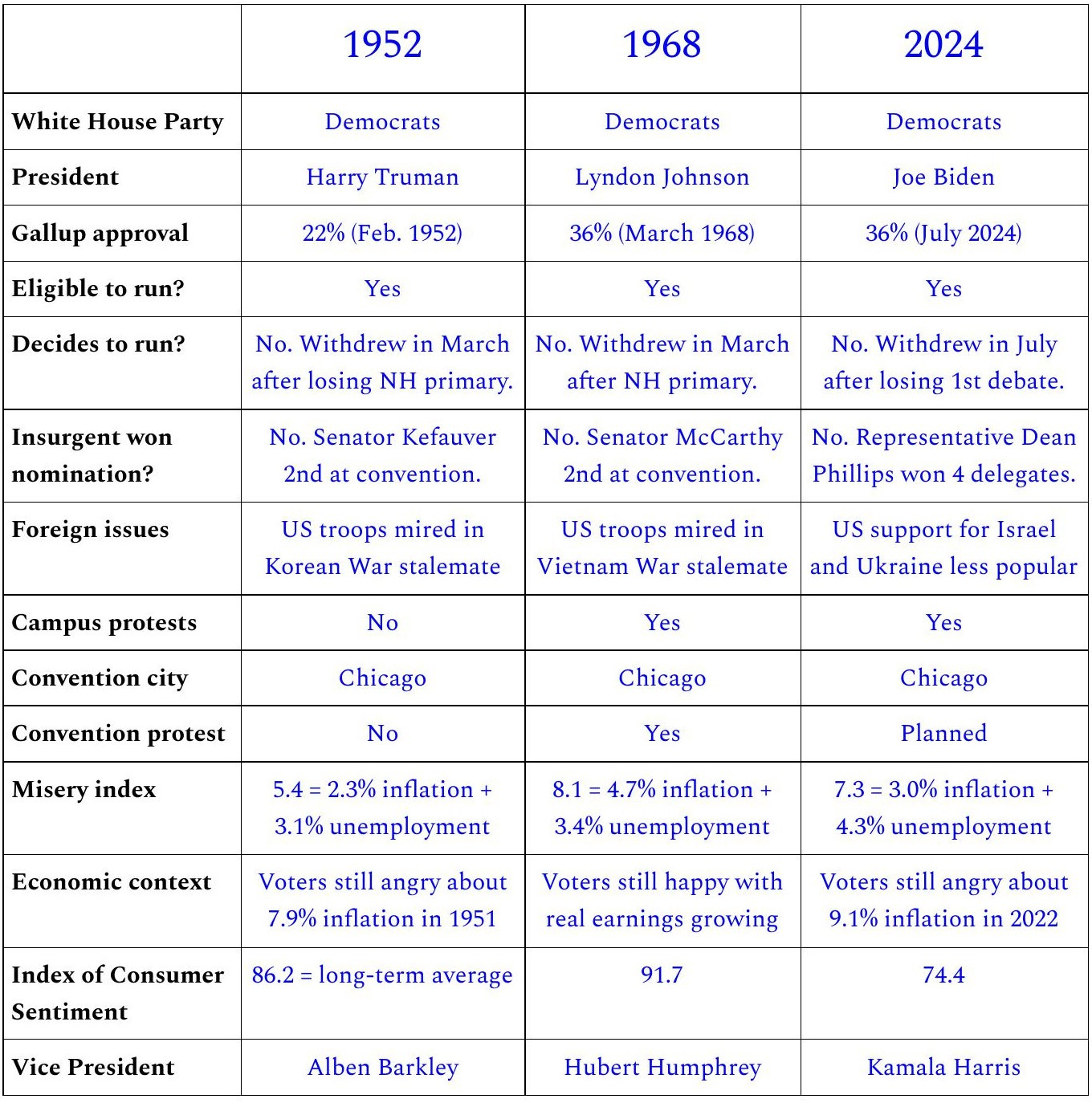Does presidential election history rhyme?
Many similarities, but Harris 2024 not doomed like Humphrey 1968, Stevenson 1952.
Official portrait of Vice President Kamala Harris Source: Library of Congress
Presidential poetry slam
Stevenson and Humphrey Went down to defeat. Do the facts in common Say Harris is beat?
Hot takes
Vice President Kamala Harris has gone ahead of Donald Trump in polls of the nation-wide popular vote largely because voters previously supporting minor-party candidates have switched to Harris.
Trump still has a good chance to win the Electoral College – especially if he focuses on voters’ economic discontent. No party in power has ever been re-elected with the Index of Consumer Sentiment as low as it is now.
If annual inflation falls below 3% and stays down before election day, “left-digit bias” might lighten voters’ economic mood enough to elect Harris.
Will history rhyme after unpopular president drops out?
In 1965, Theodor Reik wrote:
“It has been said that history repeats itself. This is perhaps not quite correct; it merely rhymes.”
Presidential politics soon proved Reik’s point. In the table below, the 1968 presidential election rhymes quite well with 1952 all the way to the end with the Democratic Party losing the White House in both years.
Sources: https://news.gallup.com/interactives/507569/presidential-job-approval-center.aspx
Notes: Misery index for September in 1952 and 1968 as the last data reported before November election day. Most recent misery index data for 2024.
So far, the rhythms of the 2024 election echo 1952 and 1968 without being perfectly in sync. Three months from now, we will know whether 2024 rhymed with 1952 and 1968 all the way to Donald Trump winning at the end.
Kamala Harris began her political career in San Francisco, home of the beat poets. If Harris wins, the 2024 election saga will have abandoned the rhyme scheme of 1952 and 1968 to end in free verse. I have adapted the last 5 lines below from a poem that then 98-year-old Lawrence Ferlinghetti wrote after Trump’s inauguration in 2017.
Stevenson and Humphrey Went down to defeat. Did the facts in common Say Harris was beat? Lawrence didn’t live long enough To tell of Trump’s encore. Biden was a Trojan horse From which the brat vice president Burst out to preserve democracy.
I will have more to say about the 1968 election in an upcoming post. Every presidential election is interesting, but the 1968 election is particularly fascinating – especially now with 2024 and 1968 being so similar so far.
2024 state of the race: Popular vote vs. Electoral College
In the RealClearPolling.com average of comprehensive 5-party polls taken after President Biden’s July 21st decision to bow out of the 2024 race in favor of his Vice President, Kamala Harris is now about 1 percentage point ahead of Donald Trump.
Source: Author’s calculations from RealClear Polling 2024-8-13 2:30 pm EDT.
Supremo analyst Nate Silver estimates that Harris needs to win the national popular vote by at least 2.5 percentage points to have a chance of winning the state-by-state Electoral College contest. If Harris wins the popular vote by 1 point on election day, her current lead in the average of credible polls, Trump will win the Electoral College.
Nonetheless, Harris even being just a bit ahead of Trump in the national popular vote is NOT expected. As we saw in the table comparing 2024 with past elections, Harris’ circumstances today are similar to the losing conditions that sank Governor Stevenson’s candidacy in 1952 and Vice President Humphrey’s campaign in 1968. In August 1968, Vice President Humphrey trailed Republican candidate Richard Nixon by nearly 20 points. Despite facing similar headwinds, Harris is ahead by a point.
2024 campaign: What next?
If the Democratic Party convention in Chicago runs smoothly later this month, Harris may get a small polling boost. A smooth Democratic convention in Chicago is a big IF as Vice President Humphrey learned in 1968.
Going into the convention, it’s remarkable that Harris is doing so well at the same time as most voters are still discouraged about the economy. In most presidential elections, voters reward or punish the party in the White House based on how they feel about the economy.
The University of Michigan’s Index of Consumer Sentiment (ICS) has proven to be the best measure of voters’ feelings about the economy going back to the 1952 election. ICS is currently hovering near the below-average levels of 1980 and 1992 when Presidents Carter and Bush were soundly defeated.
No party in power has ever retained the White House with ICS on election day as depressed as it is now.
Here is a glimmer of hope for the Democrats. Consumer sentiment was also low in the summer of 2012, before rising by October to pave the way for Obama’s re-election.
UMichigan will release the preliminary ICS reading for August this Friday the 16th. We will get our first glimpse of whether consumer sentiment up to July was being weighed down in part by voters’ feelings that President Biden was incapable of managing the economy. Will comparatively energetic Vice President Harris stepping in as the Democratic nominee help to revive consumer sentiment in August?
Will lower inflation lift voters’ economic gloom?
Consumer Price Index (CPI) inflation readings released before election day may have more lasting impact on consumer sentiment. ICS fell to an all-time low when annual inflation reached 9.1% in the summer of 2022. Consumer sentiment has revived a bit as inflation has subsided.
The CPI release tomorrow the 14th will likely show annual inflation unchanged at 3%. That news won’t move the consumer sentiment needle.
However, based on price data collected over the first third of August, the Cleveland Fed is “nowcasting” that annual inflation will fall to 2.7% in the CPI release on September 11. As the party in power, the Democrats will bask in a day of positive headlines about inflation below 3% for the first time since March 2021.
Consumers prone to “left-digit bias” perceive an item priced at $99.99 to be a significantly better value than the same product priced at $100. Similarly, voters may view a fall in inflation from 3% to 2.7% as much more significant than the decline from 3.3% in May to 3.0% in June.
If annual inflation stays below 3% on October 10, the last CPI release before the election, that might help boost Americans’ economic spirits enough to lift Harris to the 2.5+ point lead in the national polls that she needs to win the state-by-state Electoral College contest.







